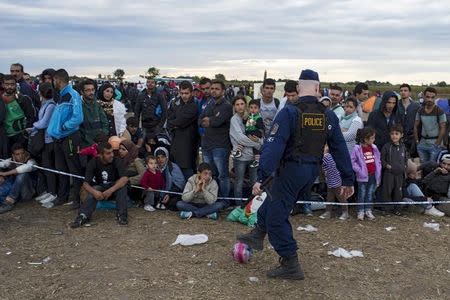Austria says time to phase out emergency measures on migrants

By Michael Shields VIENNA (Reuters) - Austrian Chancellor Werner Faymann said on Sunday it was time to phase out extraordinary measures allowing the unimpeded inflow of thousands of migrants from Hungary to Austria and Germany. "We have always said this is an emergency situation in which we must act quickly and humanely. We have helped more than 12,000 people in an acute situation. Now we have to move step-by-step away from emergency measures towards normality, in conformity with the law and dignity," he said in a statement after "intensive talks" with German Chancellor Angela Merkel and a telephone call with Hungarian Prime Minister Viktor Orban. A government official who asked not to be identified said the change meant Austria would reimpose spot checks on people entering the country, as it had before the weekend. In Budapest, Hungarian police said the announcement would not change the way they operated "The Austrian government's modification of its practices does not affect the activities of the Hungarian police. We have carried out our activities according to the law and that will not change," they said. Faymann is a Social Democrat who has led calls for compassionate treatment of refugees flooding into Europe from hot spots in the Middle East and Africa. [ID:nL5N11C03T] He said Austria and Germany would play a central role in Europe "to ensure common securing of outer borders, ensure fair asylum procedures and achieve a fair distribution of asylum seekers via a European quota". Ties with Hungary have been fraught after Austria and Germany threw open their borders to migrants at the weekend, citing a looming humanitarian crisis as thousands headed towards Austria on foot along a motorway. Austria had agreed with Germany to let them in, waiving rules requiring refugees to register an asylum claim in the first EU country they reach. Merkel's decision has caused a rift in her conservative bloc, with her Bavarian allies accused her of sending a "totally wrong signal" to the rest of Europe. [ID:nL5N11C0HM] Coordination of policy among the three countries will now take place at the level of interior ministers, assisted by Luxembourg as current president of the European Council and the UNHCR refugee agency, Faymann said. (Additional reporting by Balazs Koranyi in Budapest; Editing by Kevin Liffey)

